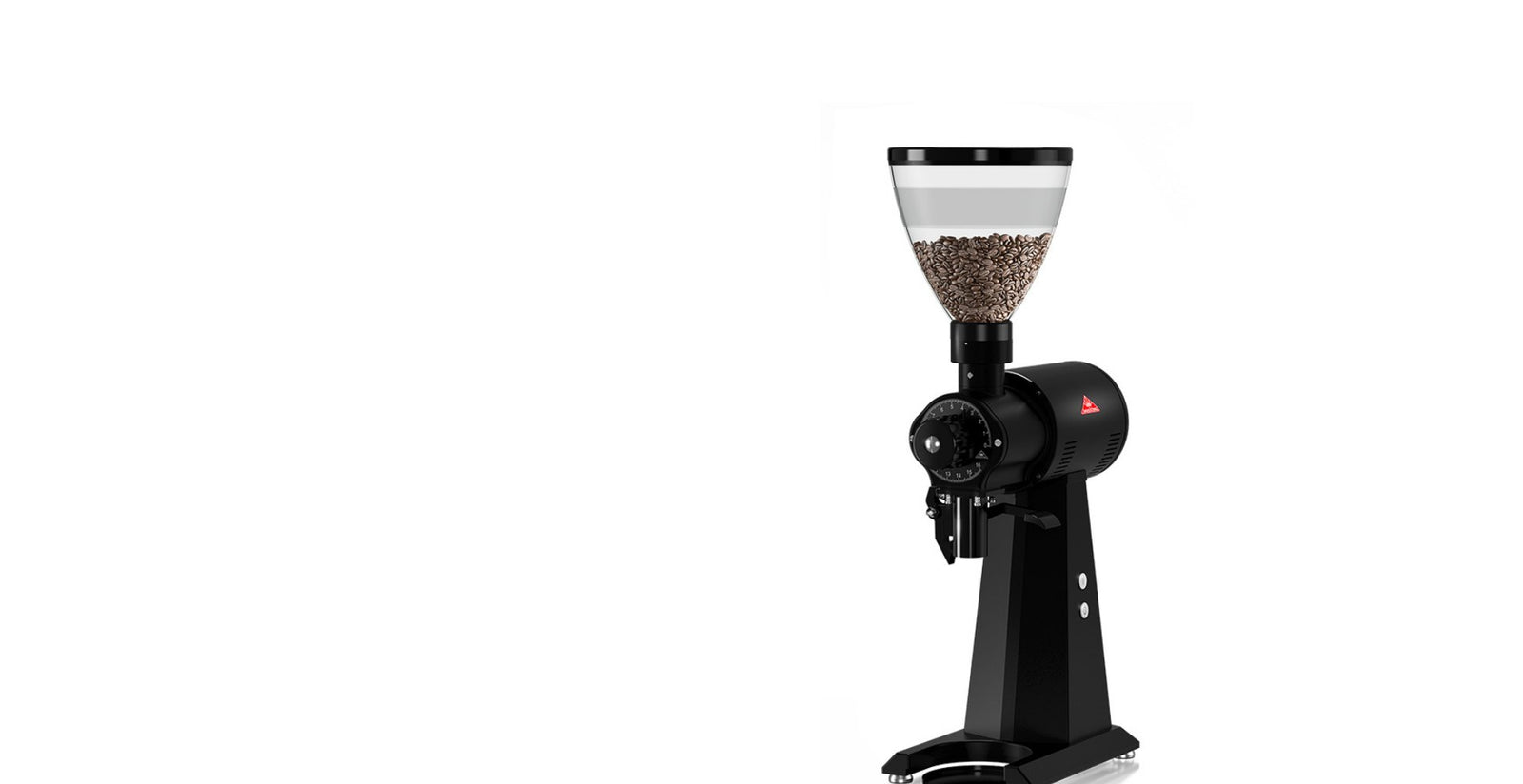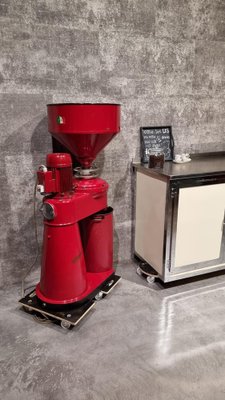Maximize Efficiency with an Industrial Coffee Grinder in Your Shop
Maximize Efficiency with an Industrial Coffee Grinder in Your Shop
Blog Article
Just How to Pick the Perfect Industrial Coffee Grinder for Your Company
Picking the optimal commercial coffee mill for your company is a multifaceted decision that requires careful consideration of numerous important variables. It is necessary to assess your details grinding needs, including the volume of coffee processed and the desired work uniformity, as these components straight influence taste and consumer contentment. Furthermore, recognizing the various kinds of grinders readily available can substantially affect your operational effectiveness. As you browse these factors to consider, one need to additionally weigh the ramifications of budget and upkeep. What various other variables could make or break your selection?
Assess Your Grinding Needs
When selecting a commercial coffee grinder, one have to initially analyze their grinding requirements to make certain optimum efficiency and consistency. This initial examination entails recognizing the quantity of coffee to be processed daily, along with the desired work size for numerous developing approaches. A high-capacity mill might be necessary for companies serving big quantities of coffee, while smaller sized operations might locate a more compact design enough.
Additionally, it is vital to think about the kinds of coffee beans being used, as various beans may require particular grinding strategies to attain the most effective flavor account. As an example, oily beans might necessitate a mill made to deal with such qualities without overheating or clumping.
One more crucial element is the required grind uniformity. Specialized coffee companies frequently require specific work sizes to improve extraction and taste, making it vital to pick a mill that can deliver consistent outcomes. Examining the available space and electric demands will aid in selecting a grinder that fits seamlessly right into your operational operations. By thoroughly assessing these variables, organizations can make educated decisions that straighten with their coffee grinding requirements, inevitably resulting in an exceptional item and pleased clients.
Understand Mill Kind
Comprehending the various kinds of commercial coffee grinders is vital for making a notified selection that meets details operational needs. There are mainly two groups of grinders: blade mills and burr mills.
Blade grinders utilize rotating blades to chop the coffee beans, resulting in an irregular work size - Industrial Coffee Grinder. While they might be a lot more budget friendly, they are frequently not ideal for business applications where precision is necessary
On the various other hand, burr grinders give a much more consistent work by squashing the beans in between 2 surfaces. They can be further categorized right into flat burr and conelike burr grinders. Flat burr mills offer a consistent work dimension and are generally favored for espresso prep work, while conelike burr mills are flexible and can handle a series of brew techniques, from espresso to French press.
When choosing a grinder, take into consideration the details needs of your organization, consisting of preferred grind consistency, production volume, and the sorts of coffee drinks you prepare to provide - Industrial Coffee Grinder. Each grinder type has its constraints and benefits, so recognizing these nuances makes it possible for informed decision-making that lines up with functional goals
Evaluate Work Dimension Uniformity
Achieving work dimension consistency is vital for creating top quality coffee, as variants in fragment size can significantly impact extraction and flavor. When choosing an industrial coffee mill, it is vital to examine exactly how well the device maintains harmony in work size throughout various sets. Inconsistent work dimensions can result in unequal extraction, causing a cup that might taste weak or overly bitter.
To examine work dimension uniformity, take into consideration grinders with features such as flexible work setups and top notch burrs. Burr mills, in particular, master producing consistent particle sizes compared to blade grinders. The product and form of the burrs play a crucial role, with stainless steel and ceramic choices offering longevity and precision.

Take Into Consideration Production Capacity
In the hectic globe of coffee manufacturing, thinking about manufacturing capacity is critical for services aiming to meet demand without compromising high quality. The production ability of a commercial coffee mill directly affects a business's capability to accomplish orders successfully, take care of stock, and reply to varying market fads.
When assessing manufacturing capacity, it is essential to evaluate the mill's outcome price, normally measured in pounds per hour. This measurement should straighten with your organization's predicted sales volume and growth targets. A café with a high turn over might require a mill that can process several hundred pounds daily, while a smaller sized procedure could suffice with a reduced capacity design.
Additionally, take into consideration the kind of coffee being refined. Various beans and blends may influence grinding speed and effectiveness, demanding a mill efficient in taking care of varied manufacturing requirements. It's also worth considering the grinder's capacity to maintain regular high quality under high output conditions, as any kind of fluctuations can impact the final item.
Inevitably, selecting a mill that matches your business's manufacturing capacity will certainly ensure you continue to be competitive and receptive to consumer expectations.

Budget and Upkeep Aspects
When reviewing the best commercial coffee maintenance, spending plan and mill factors play a that site considerable duty in the overall decision-making process,. A preliminary financial investment in a top quality grinder can generate lasting advantages, however it's important to develop a clear spending plan that aligns with your company's operational requirements. Think about both the purchase cost and prospective functional expenses, such as power usage and substitute components.
Upkeep is an additional critical aspect that can impact your budget. Industrial coffee grinders require normal maintenance to make certain optimal efficiency and long life. Review the supplier's referrals for upkeep, consisting of cleansing timetables and components replacement, as these will affect long-term operational prices. more tips here In addition, take into consideration the accessibility of service and support, as trustworthy aid can reduce downtime and repair service costs.

Spending in a grinder that is sturdy yet simple to maintain can save money over time. While lower-priced options might be tempting, they might incur higher upkeep expenses and decreased performance. Eventually, stabilizing preliminary prices with long-term upkeep and functional effectiveness will certainly assist you to the most effective selection for your organization's coffee grinding requirements.
Verdict
Choosing the suitable commercial coffee grinder necessitates an extensive analysis of grinding demands, mill kinds, grind dimension uniformity, production capacity, and budgetary considerations. A well-chosen grinder not just boosts the top quality of the coffee produced but also contributes to the overall success and profitability of the enterprise.
Specialized coffee organizations usually require exact work sizes to improve extraction and flavor, making it vital to choose a mill that can supply uniform results. Flat burr mills use a constant grind size and are usually preferred for espresso preparation, while conelike burr mills are flexible and can deal with a range of mixture methods, from espresso to French press.
When choosing an industrial coffee mill, it is vital to examine how well the machine keeps harmony in grind size throughout different sets. Burr grinders, in particular, succeed in creating uniform fragment sizes contrasted to blade grinders.Picking the excellent commercial coffee grinder demands a complete analysis of grinding demands, mill types, grind dimension consistency, production capability, and budgetary considerations.
Report this page